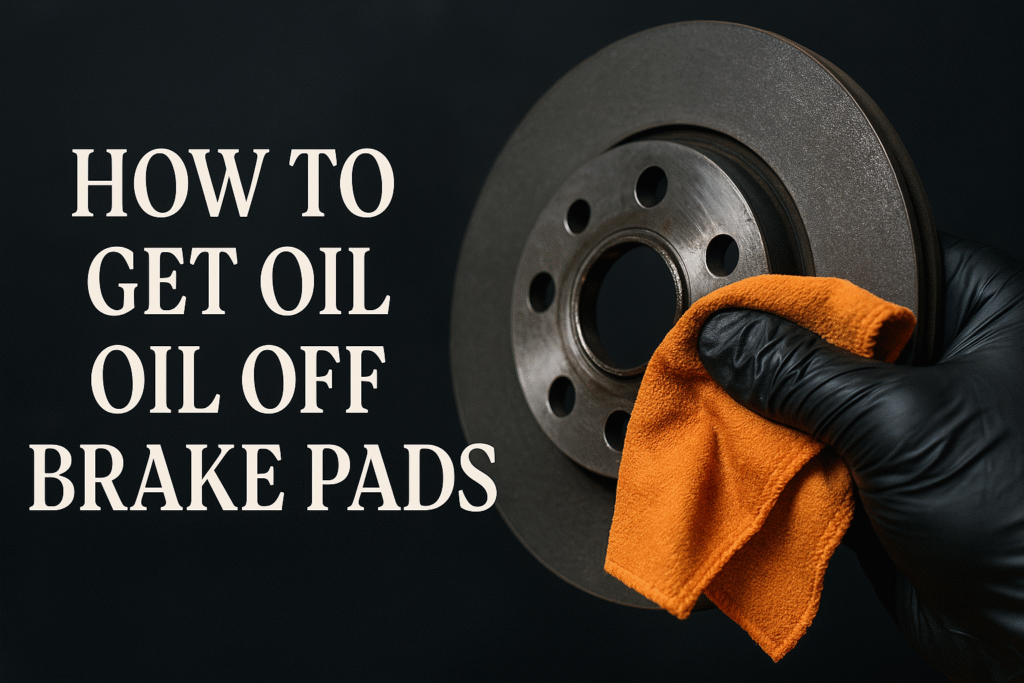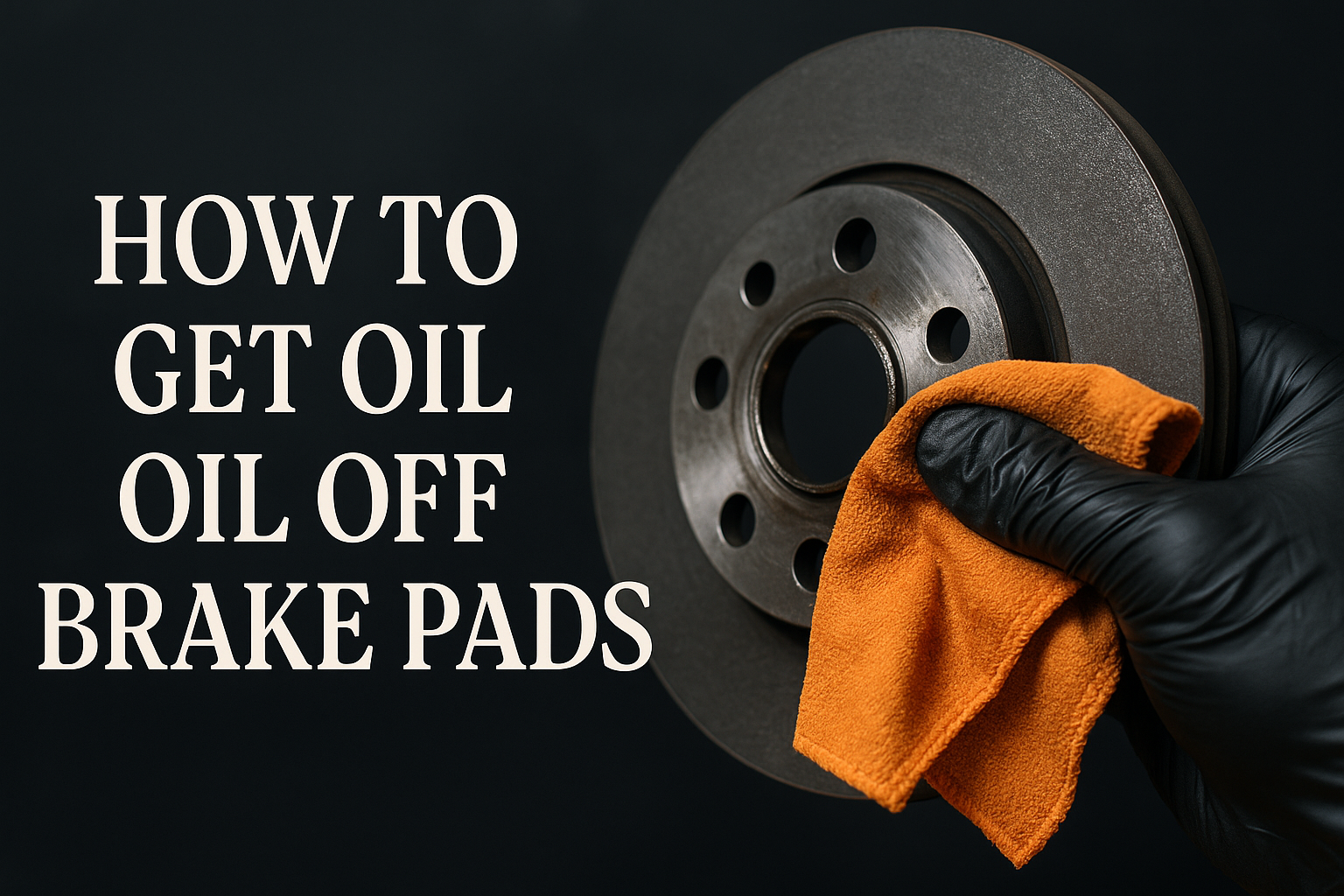If your brake pads have become contaminated with oil, there are a few steps you can take to clean them. First, try wiping the pads down with a rag soaked in mineral spirits. If that doesn’t work, you can remove the pads and soak them in a solution of water and dish soap for several hours.
Once they’ve been soaked, scrub the pads with a brush to remove any remaining oil.
- Use a paper towel to remove any excess oil from the brake pad
- Place the brake pad in a sealable bag
- Add a small amount of mineral spirits to the bag
- Seal the bag and shake it vigorously for several minutes
- Remove the brake pad from the bag and rinse it with warm water
Can You Clean the Oil off of the Brake Pads?
Yes, you can clean oil off of brake pads. However, you will need to use a special cleaner designed for this purpose. You should also avoid using harsh chemicals or solvents, as these could damage the brake pads.
How Do You Get Oil off Brakes?
If your brakes feel spongy or you notice that your vehicle is taking longer to stop, it may be time to change your brake fluid. Over time, brake fluid can become contaminated with water and other contaminants, which can cause corrosion and wear on your braking system. To flush your brake fluid, you’ll need to remove the old fluid from the system and replace it with fresh, clean brake fluid.
Here’s how to do it:
1. Start by bleeding the brakes at each wheel using a bleeder wrench or similar tool. This will help to remove any air bubbles from the system and make sure that the new fluid is able to flow freely through the system.
2. Next, locate the master cylinder for your brakes (usually under the hood) and remove the cap. You’ll then need to use a funnel or similar device to pour fresh brake fluid into the reservoir until it reaches the “full” line. Be sure not to overfill!
3. Once you’ve added fresh brake fluid, close up the reservoir and start pumping the brakes slowly until they feel firm again – this will help bleed any air out of the lines and get new fluid into all areas of the system. Test drive your vehicle in a safe area before heading back out onto busy roads.
Does Oil Damage Brake Pads?
Yes, oil can damage brake pads. When oil leaks onto the brake pad, it can cause the pad to become brittle and break. This can lead to decreased braking power and increased wear on the pads and rotors.
If you notice an oil leak, it’s important to have it repaired as soon as possible to avoid these issues.
How To Remove Oil From Your Disc Brakes On A MTB
Oil on Brake Pads Car
If your car has oil on the brake pads, it’s important to take care of the problem as soon as possible. Oil can cause the brake pads to break down and wear out prematurely. It can also lead to brake noise and vibration.
The most likely cause of oil on the brake pads is a leaking seal or gasket. The seals and gaskets around the brakes are designed to keep oil and other fluids from getting onto the braking components. But over time, these seals can degrade and start to leak.
If you suspect that a seal or gasket is leaking, it’s best to have it inspected by a qualified mechanic.
In some cases, you may be able to clean off the oil yourself with some brake cleaner and a rag. But if there’s a lot of oil, or if it seems like it’s seeping into the pad material, then replacement is probably your best bet.
New brake pads are relatively inexpensive, so it’s not worth taking chances with your safety by putting off this repair.
How to Clean Bike Brake Pads Without Removing Wheel
If your bike’s brake pads are looking a little worse for wear, you can clean them without having to remove the wheel. Here’s how:
1. Use a stiff brush to remove any loose dirt or debris from the surface of the pads.
2. Spray the pads with a degreaser or citrus-based cleaner and let it soak in for a few minutes.
3. Scrub the pads with a nylon brush to loosen any stubborn grime.
4. Rinse the pads with water and dry them off completely before replacing them on your bike.

How to Clean Brake Pads Without Removing Wheel
If your brake pads are making noise or not working as effectively as they should, it may be time for a cleaning. But you don’t necessarily have to remove the wheel to do so. Here’s how to clean brake pads without removing the wheel:
1. Use a wire brush or a toothbrush to remove any dirt or debris from the surface of the brake pad. Be sure to get in all the nooks and crannies. 2. Apply some rubbing alcohol or brake cleaner to a clean rag and wipe down the entire surface of the brake pad.
This will help remove any remaining dirt and grime. 3. Use compressed air to blow out any dust or debris that may be inside the braking system. You can also use a vacuum cleaner with an attachment designed for this purpose.
4. Once everything is clean, apply some fresh grease to the back of the brake pad (where it contacts the caliper) and reinstall it on your vehicle.
How to Clean Oil off Brake Rotors
If your brake rotors are looking a little grimy, it’s important to clean them off as soon as possible. Here’s how to do it:
1. First, remove any brake pads or other components that might be in the way.
2. Next, use a brush or rag to remove any surface dirt or debris from the rotor.
3. Once the surface is clean, you can move on to cleaning the oil off the rotor itself. To do this, you’ll need some brake cleaner and a lint-free cloth.
Spray the brake cleaner onto the cloth and then wipe down the rotor until all of the oil is removed. Be sure to work in small sections so that the cleaner doesn’t have a chance to dry on the surface of the rotor.
Conclusion
If your brake pads have become contaminated with oil, it’s important to clean them off as soon as possible. Oil on your brake pads can cause braking problems and may even damage your brakes. To remove oil from your brake pads, start by wiping them down with a clean cloth.
If the oil is still present, you can try using a degreaser or Brake Cleaner. If these products don’t work, you may need to replace your brake pads.




Leave a Reply